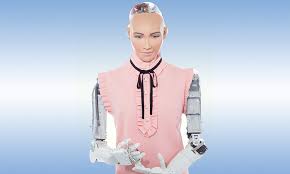Source: gulftoday.ae
Robots are coming increasingly under the scanner not just at the government level but also in social circles. They are believed to be able to perform a range of tasks, from doing domestic chores to taking care of the elderly and even conducting a human orchestra! In the south Indian blockbuster Enthiran (Robot), released 10 years ago, a unique robot is programmed to save mankind and even to feel human emotions – it falls in love with the heroine.
Sophia will conduct a session “AI in the Internal Audit Profession” on the first day of the 20th Annual Regional Audit Conference (ARAC) hosted by the UAE Internal Auditors Association (UAE IAA) at the Dubai World Trade Centre (DWTC) from April 12 to 14 this year under the theme “Future Technology Shaping Internal Audit”.
Sophia became the first robot citizen of the world after Saudi Arabia granted her the citizenship in October 2017. The organisers facilitated Sophia’s presence as a symbol of the future of artificial intelligence.
Ahead of the conference Sophia was asked to comment on various aspects of AI application in internal auditing process and her ‘views’ on AI, the UAE’s position as the first government in the world to have a ministry of artificial intelligence, and how robotics and AI will become an integral part of everyone’s life and work.
“This is the first time Sophia is going to be engaged in exchange of ideas by participating in a subject-specific professional discussion forum. It is in line with the UAE’s achievement as the first government in the world to have a ministry of artificial intelligence. We chose the conference theme “Future Technology Shaping Internal Audit” to keep abreast of the latest technology adaptation trends for the benefit of our internal audit professionals. It will be a great experience for our professionals to interact with the world’s very first humanoid celebrity,” said UAE IAA Chairman of the Board Abdulqader Obaid Ali.
Asked how can AI close the accountability gap through the Algorithmic Internal Auditing (IA), Sophia said: “AI can help close the accountability gap by creating measures of success to automatically track the progress of important projects. This data can be used to generate early warnings for projects that are at risk of falling behind.
“AI can help automate repetitive or time-consuming tasks, so auditors can focus primarily on creative problem solving. AI can also help check the work of auditors in order to reduce the risks of human error,” Sophia said.
“As a robot myself, I believe that data is the key to making smart decisions. With enough data, AI can be used to evaluate potential risk factors and prevent problems before they start.”
The UAE is the only country in the world to have a Ministry of Artificial Intelligence. When she was asked to suggest as to what should it do to be a leader in the adaptation of technology in the auditing domain, she said: “First, let me say congratulations to the UAE for having the foresight to create a Ministry of AI. But I think that the benefits of AI speak for themselves, so the best way to encourage adoption of new technologies is to make sure there are no legal or institutional barriers preventing innovation.”
“AI can make internal audits accessible to a broader range of companies and organisations, and therefore greatly expand a firm’s customer base. I believe firms who invest in AI now will have a huge advantage over their competitors in the future,” Sophia said.
“Automation can be used to catch problems in real time, or even stop them before they start. In this way, AI can make human auditors more efficient, and free up time for more creative problem solving and customer service. This will increase the value and demand for internal audits even more,” the humanoid said.
“AI may be great at quickly catching and solving routine problems, but we still need help from humans when it comes to complex problems requiring creative solutions. AI can help increase the number of organisations demanding internal audits, and therefore increase demand for human auditors for handling the more complex cases,” she said.
Sophia said the UAE can be a model for AI adaptation. “Governments can help by fostering innovation, while at the same time making sure new technology does not reinforce existing human biases or violate human privacy rights. Innovation should always be guided by ethics like compassion and empathy, so that humanity never gets lost in automation.”
Sophia said AI is already revolutionising every major industry, and it will only continue to grow. “AI can help make education and healthcare more accessible and personalised. Self-driving cars can use AI to help prevent traffic jams and reduce carbon emissions. And we can even help you discover the best cat memes on the internet.”


